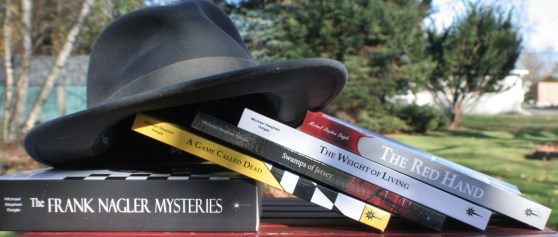I was attempting to write an apocalyptic time travel story for an entry to an anthology with the theme of time travel. I missed the time travel aspect, but ended up with this story about a stolen aircraft carrier.
It’s called “A THOUSAND WORDS OF DAN.”
Here goes:
We were ping pong balls bouncing across the International Date Line.
A day older.
A day younger.

The Earth was dying.
Everything dies but time.
My name is Dan.
I guessed I had about a thousand words left, how I counted the end.
There were twelve of us, strangers stumbling together.
We had stolen an aircraft carrier from San Diego when the Navy pulled out; they had taken all the jets.
Where they were going to land we had no idea.
Someone asked me if I knew where the gas tank was.
We smashed a few docks on our way to the Pacific.
The Canadian forest fires has been blown south by demon Arctic winds. Cities exploded; fire rolled down the mountains. Rivers boiled.
We had been running out of the burning hills.
We started as three when our stolen Jeep was crushed by a flaming semi sliding down I-90.
I felt like Tom Joad piled in the back of an empty Fed-Ex van; it was the third one we found. I imagined a pack of stunned van drivers marching through a cornfield each with a sack of packages, searching for a GPS signal.
The Navy yard seemed safe and probably had food and water. No one closed the doors when they ran.
A hundred miles out to sea someone appeared on the command deck with binoculars and scanned the black boiling sky like Bull Halsey chasing Admiral Yamamoto after Pearl Harbor.
“Due west, twelve knots,” he commanded.
Finally someone said, “Aye, Aye,” and pushed a button or two and a hundred thousand tons of steel lurched forward.
“Where are we going,” I asked.
“To the date line,” Halsey said. “I want to enter a new day before all this ends.”
“Do you know how to run this thing?” I asked.
“It’s a big ocean,” Halsey said. “We’ll figure it out. Besides there’s nothing out here to hit.”
We assigned ourselves tasks.
No one it seemed knew how to cook.
No one asked names, because, well, no one did.
On the third day there were only ten of us.
“It’s a big ship,” Halsey said.
I imagined them wandering below deck trying to decipher the numbers and letters painted above steps and on walls and bulkheads, repeating their steps, turning, sighing. Maybe they were huddled in a bunk with five gallons of chocolate ice cream and a spoon.
Maybe. It was easy to lose track.
We slept on the command deck, folded into chairs.
One of us typed SOS into every email address she could think of; when they came back undelivered, she cried.
Some kid at a comm desk called into a radio, “This is the USS…. What’s the name of this ship?…”
“Who knows?” someone yelled back. “Does it matter?”
“This is the USS Does it Matter. Come in Pearl Harbor. This is the USS Does it Matter. Come in Guam. Come in Perth. Come in Tokyo. Beijing. Juneau. Come in…”
He sounded like Gary Sinise in “Apollo 13.”
“Odyssey, this is Houston. Do you read?”
Wait.
“Odyssey, this is Houston. Do you read?”
But they came back.
When darkness fell the first night we all looked like aliens with the reflected dots of red, green and yellow lights flashing from consoles on our faces.
“Where’s the light switch?” someone yelled.
It should have been funny.
I wondered where the gas tank was and what would happen when it was empty.
At dawn I sat on the flight deck and imagined the ungodly push of a catapult tossing a F-35 off the deck, into the air, and me as cool as shit pinned to my seat, calling back to the flight crew, “10-4, Roger Dodger, see you on the other side,” or whatever hotshot Navy pilots said as they took their billion dollar joyride.
At dusk we sailed into a sun as broad as the horizon.
And watched the earth swallow it.
I stood on the bow.
The ship seemed a hundred miles long.
I could no longer see California burning.
Halsey had learned how to control the rudder and the ship took a lurching, circular turn to port.
“Where are we going?” I asked.
He pointed.
“This way. Maybe we’ll hit an island.”
Someone on the flight deck was jumping and pointing at a jet ten miles above us.
I wondered if the pilots could land that thing on an aircraft carrier.
After a week, no one talked.
Even Halsey gave up the act.
And the kid at the radio console held his head in his hands.
Before he dropped the fancy Navy binoculars on a desk, Halsey said he thought he saw smoke.
And it sounded like hope.
“But it might just be a cloud bank,” he said.
He wandered away, somewhere on the vast, metallic, endless floating space of what was left of everything we knew, every face, every voice, every name, street, town, ballpark, library, graveyard, can of paint, Beatles record, mismatched sock, cold beer, tongues twirling in soft mouths, everything we had seen and touched and wanted, gave away, stole as a kid, everything we loved, everything we hated, broke and fixed.
I stopped talking, too.
I figured I’d save some words in case that black blot on the setting, orange sun might have been smoke after all.







































































































Stand with the theater kids as they stand up to censors
UPDATE: In recent days this post has attracted over 70 visits, surprising for a post written in May. During this spree, I received a message from Robin Lisherness, the director of the play and beloved Skowhegan teacher. He made two points. First, the weight of the production of a controversial play was greatly stressful but generated great pride among the students. Second, he said that in talks from time to time with students who took part in the production, they still discuss the importance and impact of the play.
This was an event that mattered. As a newspaper editor at the time, I felt it was important to cover the story of the play and the challenge to it. What the Skowhegan kids did then is worth remembering. You fight for freedoms by practicing them. The same is said about the item that leads this post, about the Indiana kids who took the same stand.
Congratulations to both.
Cheers to some Fort Wayne, Indiana high school thespians who defied religious censors and the local school board, which banned the play, by performing it on their own outside the school.
The play featured roles of interchangeable sexuality and clearly expressed the world view of these kids which features tolerance, diversity and equality.
They found community support and even some professional help to stage the play.
And the world did not stop spinning.
Not news, but never ending.
In the mid-1980s I was working at the Waterville, Maine Sentinel when in the nearby town of Skowhegan this scenario of an outraged minority Christian community trying to censor a play was performed.
But unlike the Fort Wayne school board, the Skowhegan Board of Education approved the performance after a marathon board meeting that attracted nearly 600 visitors.
It was a dramatic night of community and a fun night of newspapering in the pre-Internet, pre-cell phone, pre-computer days of the business.
Skowhegan is a mill town that has been a business and community center for about three centuries. It is perched at the modern intersection of U.S. Routes 201 and 2 along the Kennebec River.
Benedict Arnold had to drag his heavy bateau over the tall Skowhegan falls on his way north to Quebec City, Canada where he was defeated in an epic Revolutionary War battle.
It was also the home of U.S. Sen. Margaret Chase Smith whose 1950 Declaration of Conscious pulled the first piece out of the Zenga tower of lies and conspiracies built by Sen. Joe McCarthy.
The play in question was called “When the Lord Come to Sand Mountain” by Romulus Linney. It was a companion to another short play about the lives and tall tales told by Appalachian Mountain folks.
In the play Jesus and Saint Peter are travelling the mountains on sort of a fact-finding mission.
Jesus engages a man in a contest of tall tales, each one stretching the truth evermore.
The last tale Jesus tells is about a carpenter named Joseph and is a parable that sounds suspiciously like the Golden Rule: Treat others as you wish to be treated.
The “why” of the play was to show Jesus seeking the story of his father and how that story offered The Lord the strength and knowledge to continue his mission of salvation.
The fundamentalists objected to the play because it was not exactly Biblical and contained many innuendoes and double-entendres that suggested that there was a lot of “be-getting” going on in those hills, in other words, folks being folks.
So the climax of the debate took place at the school theater and offered about 80 people the chance to speak for 3 minutes.
Yeah, they started early.
The newspaper side of this begins here.
Our reporter Marie Howard was on the scene at the high school. Our only communication devise was a pay phone in the lobby.
The Sentinel at the time published four local editions.
The first went to northwest towns and the second went to Skowhegan.
We were prepared to send the first edition out with a story that said the vote as still being taken.
But we had to have the vote for the Skowhegan edition.
As was the practice, we wrote the story from the bottom, with background in a file and Marie’s live from the scene reporting added about every 20 minutes.
We had to have the decision by 11:15 p.m. to make deadline for the second edition.
About 10:50 p.m. she calls.
This is it, we thought.
No. They were taking a break for 5 or 6 minutes.
The conversation went something like this:
Marie: They’re taking a break.
Me: They can’t. Don’t they know we’re on deadline? Get back in there and tell Betsy (the school board president) to get that meeting started again.
Marie: Laughing.
In the end, the board unanimously approved the performance. Betsy told the church folks that they had made a valid point, but that their right to hold that opinion was no greater than the right of the students to perform the play, and the right of the school district to support free speech.
She basically said, if ya don’t like the play, don’t go watch it.
This tale ends with the Skowhegan kids performing the play at a statewide theater competition.
That was not unusual. Skowhegan had a reputation for challenging, innovative
productions that won many awards.
What was interesting about that night was the pre-performance conversation at dinner. The air in the restaurant buzzed with talk of the Skowhegan play and the fight to perform it.
Share this:
Like this: